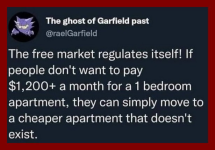Most people, when discussing capitalism, really mean "market capitalism" or a "(relatively) free market economy". The distinction is relevant, and particularly important, when discussing participants in the global economy.
"A capitalist economy and a
free market economy are two types of economic systems. Often the terms are used interchangeably, especially in casual parlance. But, while they have overlapping qualities, the two are not quite the same thing."
How Is a Capitalist System Different Than a Free Market System? (Investopedia).
"Capitalist and free-market systems do spring from the same economic soil, so to speak: the law of
supply and demand, which becomes the basis to determine the price and production of goods and services.
But they refer to different things.
Capitalism is focused on the creation of wealth and ownership of capital and
factors of production, whereas a free market system is focused on the exchange of wealth or
goods and services." "(I left the links in, in case anyone wants to explore more.)
I make this observation because much of the global market is generally a free market, but not all the participants are capitalists, and some of the purportedly capitalist participants are really state actors, even if operated in a capitalist form (e.g. Russian oligarchs; Chinese state companies; Arab sovereign wealth funds). Some state actors also manipulate the markets openly (e.g. OPEC, European Union).




